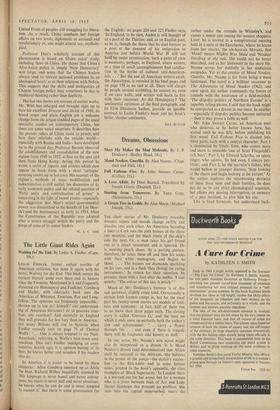The Little Giant Rides Again
Waiting fa the End. By Leslie A. Fidler. (Cape, 30s.) LESLIE FIEDLER, former enfant terrible of American criticism, has done it again with his latest, Waiting for the End. This book covers the current literary scene over there and its history since the Twenties. Mentioned in it and frequently dissected are Hemingway and Faulkner, Ginsberg and Mailer, with sidetracks back into the Americas of Whitman, Emerson, Poe and Long- fellow. The opinions are frequently impossible: thrown up to test us? himself? our understand- ing of American literature? or to provoke reac- tion, any reaction? And naturally in England they will provoke far less fury than in America : not many Britons will rise to hysteria when Fiedler casually says on page 79 of Thomas
Wolfe : . . One is almost tempted to say Nazi- American,' referring to Wolfe's hick-town anti- semitism. This isn't Fiedler indulging an over- sensitive Jewish ego, it is opinion-baiting at its best; he knows better and wonders if his readers also do.
In America it is easier to be lured by these chimeras : Allen Ginsberg summed up as Attila the Hun, Richard Wilbur beautifully damned by 'His language is never banal and never outrag- eous; his music is never dull and never atrocious; he knows what he can do and is never tempted to exceed it.' But there is some provocation for
the English: on pages 224 and 225 Fiedler says, 'In England, to be sure, Auden is still thought of as a poet of the Thirties; and, as an English poet, so he is, though the thesis that he died forever as a poet at the moment of his emigration to America just before World War II will not hold up under examination. Such a point of view is necessary, perhaps, in England, where writers, at a time of small accomplishment find satisfac- tion in the myths of cultural anti-American- ism. . ..' But the end all American writers await, the Apocalypse, is revealed in his final pages and on page 178 as no end at all. There will always be people around scribbling, he assures us, even if on cave walls; and writers will learn to live with their successes. As did Hemingway? The sentimental optimism of the final paragraph, and its Elsie Dinsmore bathos, provide an ignoble contrast to Leslie Fiedler's book and his book's better, sharper sentiments.
BILL BUT! ER






























 Previous page
Previous page